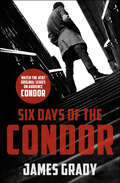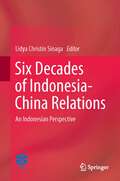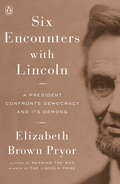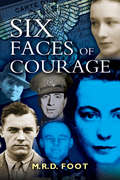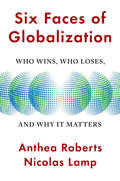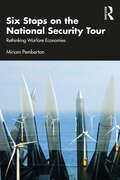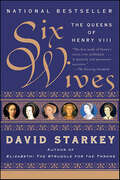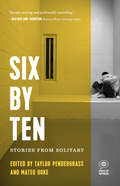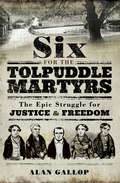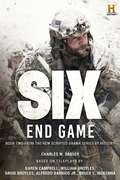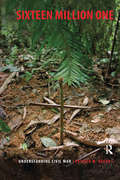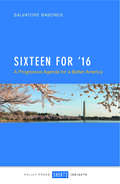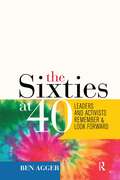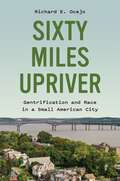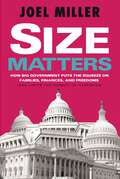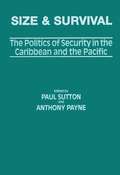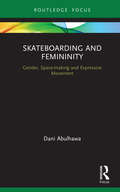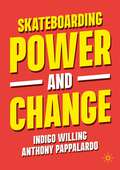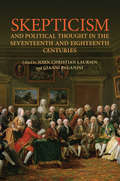- Table View
- List View
Six Days of the Condor (Condor)
by James GradyThe classic spy thriller about corruption in the CIA that inspired the hit film and TV show: &“A master of intrigue&” (John Grisham). Sandwiches are a part of Ronald Malcolm&’s every day, but one just saved his life. On the day that gunmen pay a visit to the American Literary Historical Society, he&’s out at lunch. The society is actually a backwater of the Central Intelligence Agency, where Malcolm and a few other bookworms comb mystery novels for clues that might unlock real life diplomatic questions. One of his colleagues has learned something he wasn&’t meant to know. A sinister conspiracy has penetrated the CIA, and the gunmen are its representatives. They massacre the office, and only learn later of Malcolm—a loose end that needs to be dealt with. Malcolm—codename Condor—calls his handlers at the agency, hoping for a safe haven, instead drawing another attempt on his life. With no one left to trust he goes on the run. But like it or not, Malcolm is the only person who can root out the corruption at the highest levels of the CIA. This &“chilling novel of top security gone berserk&” earned James Grady his reputation as a Grand Master of the spy thriller, inspiring legions of imitators as well as the classic Sydney Pollack film Three Days of the Condor and the new TV series Condor featuring Max Irons, Mira Sorvino, and Brendan Fraser (Library Journal).
Six Decades of Indonesia-China Relations: An Indonesian Perspective
by Lidya Christin SinagaThis book analyses the relations between Indonesia and China in the regional dynamics of Southeast Asia. The rising China has influenced global and regional constellations, and also has direct impacts for Indonesia. While this fact should be viewed as an opportunity that needs to be fully utilised for the benefit of national development of Indonesia, we should also prepare for the threats embedded in this development, especially from the service and labour sectors. As such, this book suggests that equal positions in relations between Indonesia and China are absolutely necessary, since both countries need each other in their efforts to maintain the continuity of their development. It also argues that to further strengthen its position in relation to China in the future, Indonesia's diplomacy requires an integrated grand design that supports the creation of economic and political power in the face of the emergence of China's economic and military power.
Six Encounters with Lincoln: A President Confronts Democracy and Its Demons
by Elizabeth Brown PryorFrom an award-winning historian, an engrossing look at how Abraham Lincoln grappled with the challenges of leadership in an unruly democracy“Fascinating reading. . .this book eerily reflects some of today’s key issues.” – The New York Times Book Review An awkward first meeting with U.S. Army officers, on the eve of the Civil War. A conversation on the White House portico with a young cavalry sergeant who was a fiercely dedicated abolitionist. A tense exchange on a navy ship with a Confederate editor and businessman. In this eye-opening book, Elizabeth Brown Pryor examines six intriguing, mostly unknown encounters that Abraham Lincoln had with his constituents. Taken together, they reveal his character and opinions in unexpected ways, illustrating his difficulties in managing a republic and creating a presidency. Pryor probes both the political demons that Lincoln battled in his ambitious exercise of power and the demons that arose from the very nature of democracy itself: the clamorous diversity of the populace, with its outspoken demands. She explores the trouble Lincoln sometimes had in communicating and in juggling the multiple concerns that make up being a political leader; how conflicted he was over the problem of emancipation; and the misperceptions Lincoln and the South held about each other. Pryor also provides a fascinating discussion of Lincoln’s fondness for storytelling and how he used his skills as a raconteur to enhance both his personal and political power. Based on scrupulous research that draws on hundreds of eyewitness letters, diaries, and newspaper excerpts, Six Encounters with Lincoln offers a fresh portrait of Lincoln as the beleaguered politician who was not especially popular with the people he needed to govern with, and who had to deal with the many critics, naysayers, and dilemmas he faced without always knowing the right answer. What it shows most clearly is that greatness was not simply laid on Lincoln’s shoulders like a mantle, but was won in fits and starts.
Six Faces of Courage
by Michael FootProfessor Michael Foot is indisputably the greatest authority on the activities of SOE in Europe during WW2. In Six Faces of Courage he selects six of the bravest of the brave agents and describes their backgrounds, activities and characters. Truly inspiring reading complemented by an updated introduction that sets the scene superbly. This excellent and successful book gives the reader a real insight to what it meant to be a SOE agent in Nazi-occupied Europe.
Six Faces of Globalization: Who Wins, Who Loses, and Why It Matters
by Anthea Roberts Nicolas LampAn essential guide to the intractable public debates about the virtues and vices of economic globalization, cutting through the complexity to reveal the fault lines that divide us and the points of agreement that might bring us together. Globalization has lifted millions out of poverty. Globalization is a weapon the rich use to exploit the poor. Globalization builds bridges across national boundaries. Globalization fuels the populism and great-power competition that is tearing the world apart. When it comes to the politics of free trade and open borders, the camps are dug in, producing a kaleidoscope of claims and counterclaims, unlikely alliances, and unexpected foes. But what exactly are we fighting about? And how might we approach these issues more productively? Anthea Roberts and Nicolas Lamp cut through the confusion with an indispensable survey of the interests, logics, and ideologies driving these intractable debates, which lie at the heart of so much political dispute and decision making. The authors expertly guide us through six competing narratives about the virtues and vices of globalization: the old establishment view that globalization benefits everyone (win-win), the pessimistic belief that it threatens us all with pandemics and climate change (lose-lose), along with various rival accounts that focus on specific winners and losers, from China to America’s rust belt. Instead of picking sides, Six Faces of Globalization gives all these positions their due, showing how each deploys sophisticated arguments and compelling evidence. Both globalization’s boosters and detractors will come away with their eyes opened. By isolating the fundamental value conflicts—growth versus sustainability, efficiency versus social stability—driving disagreement and show where rival narratives converge, Roberts and Lamp provide a holistic framework for understanding current debates. In doing so, they showcase a more integrative way of thinking about complex problems.
Six Presidents from the Empire State
by Harry J. SieversEssays about Presidents Fillmore, Roosevelt, Arthur, Van Buren, Cleveland, and FDR.
Six Stops on the National Security Tour: Rethinking Warfare Economies
by Miriam PembertonThe U.S. military economy incorporates hundreds of American communities. This is the first book to connect our national security apparatus to the local level via deeply reported portraits of six carefully selected locations, including military Meccas and out-of-the-way places. They are woven into the warfare economy by bases, nuclear weapons labs, and production sites. The book includes an invaluable overview of how the military is structured, how its budget is made, and what it costs. It also shows how the military economy perpetuates itself. In on-the-ground reporting, Pemberton traces the lines of connection between the tour stops presented here and our country’s foreign policy, industrial policy, and budget priorities. She examines the meaning of national security in the current moment, as climate change becomes what the military itself calls "an urgent and growing threat." And she dramatically demonstrates how redirecting our militarized foreign and industrial policy toward climate security can help these communities become part of the solution. For students, scholars, public servants, and all concerned citizens, this book is essential reading.
Six Wives: The Queens of Henry VIII
by David StarkeyThe dramatic, legendary story of Henry VIII, his six wives, and the England they ruled—told by one of the world’s preeminent historians of the Tudor era.“Extraordinary. . . . It is a tribute to Starkey’s narrative drive, his puckish wit, and sharp discrimination that it doesn’t seem a page too long. . . . With each queen, Starkey offers a vivid character study but also has fresh discoveries that subtly alter the picture he started out with.” —Sunday Times (London)No one in history had a more eventful career in matrimony than Henry VIII. His marriages were daring and tumultuous, and made instant legends of six very different women. In this remarkable study, David Starkey argues that the king was not a depraved philanderer but someone seeking happiness—and a son. Knowingly or not, he elevated a group of women to extraordinary heights and changed the way a nation was governed.Six Wives is a masterful work of history that intimately examines the rituals of diplomacy, marriage, pregnancy, and religion that were part of daily life for women at the Tudor Court. Weaving new facts and fresh interpretations into a spellbinding account of the emotional drama surrounding Henry’s six marriages, David Starkey reveals the central role that the queens played in determining policy. With an equally keen eye for romantic and political intrigue, he brilliantly recaptures the story of Henry’s wives and the England they ruled.“The best study of Henry’s wives ever published. . . . A masterly and persuasive narrative.” —The Evening Standard (London)“Eminently interesting. . . . A boon to fans of English royal history, full of murder and mayhem, but also of solid analysis of a maddeningly complicated era.” —Kirkus Reviews (starred review)
Six Years at Sea... and Counting: Gulf of Aden Anti-Piracy and China's Maritime Commons Presence
by Andrew S. Erickson Austin M. StrangeWell over six years of Chinese anti-piracy operations in the Gulf of Aden have directly supported People's Liberation Army Navy (PLAN) modernization goals and provided invaluable experience operating in distant waters. Lessons learned have spawned PLAN innovations in doctrine, operations, and international coordination. Many of the insights gleaned during deployments are applicable to security objectives closer to home; some officers enjoy promotion to important positions after returning. Anti-piracy operations have been a springboard for China to expand considerably its maritime security operations, from evacuating its citizens from Libya and Yemen to escorting Syrian chemical weapons to their destruction and participating in the search for Malaysia Airlines Flight 370. So great are the benefits to China's global maritime presence and enhanced image at home and abroad that when Gulf of Aden anti-piracy operations finally wind down, Beijing will have to develop new means to address its burgeoning overseas interests.
Six by Ten: Stories from Solitary (Voice of Witness)
by Taylor Pendergrass and Mateo HokeThirteen personal accounts of solitary confinement’s devastating impact in the United States criminal justice system.Six by ten feet. That’s the average size of the cells in which tens of thousands of people incarcerated in the United States linger for weeks, months, and even decades in solitary confinement. With little stimulation and no meaningful human contact, these individuals struggle to preserve their identity, sanity, and even their lives. In thirteen intimate narratives, Six by Ten explores the mental, physical, and spiritual impacts of America’s widespread embrace of solitary confinement. Through stories from those subjected to solitary confinement, family members on the outside, and corrections officers, Six by Ten examines the darkest hidden corners of America’s mass incarceration culture and illustrates how solitary confinement inflicts lasting consequences on families and communities far beyond prison walls. Stories include those of Brian, who was shuttled from prison to prison across Illinois as part of an unofficial program that came to be known as “the circuit”; Heather, a mother fighting for the life of her son, Nikko, who was diagnosed as bipolar at a young age and sent to solitary as a teenager; and Sonya, a trans woman sent to solitary in a men’s jail in Texas, supposedly for her own protection.Praise for Six by Ten“A consistently eye-opening, urgent report on the use and misuse of prisoner isolation.” —Kirkus Reviews“Compels change by giving a voice to the voiceless . . . . The stories stop you in your tracks, but the appendices help move progress forward with simplicity, depth, and hope, beginning with ten things anyone can do that are impactful and accessible. The educational pieces of the book give apt background on the history and usage of solitary confinement, allowing even those examining the practice for the first time to have a firm grasp of the situation.” —Foreword Reviews“A deeply moving and profoundly unsettling wake up call for all citizens. The use of solitary confinement is deeply immoral and we must insist that it be banned in all of our nation’s prisons. Immediately.” —Heather Ann Thompson, Pulitzer Prize–winning author, Blood in the Water: The Attica Prison Uprising of 1971 and Its Legacy
Six for the Tolpuddle Martyrs: The Epic Struggle for Justice & Freedom
by Alan GallopIn 1834 six farm laborers from the Dorset hamlet of Tolpuddle fell foul of draconian Victorian laws prohibiting assembly. Today the names of George Loveless and his brother James, Thomas Standfield and his son John, James Brine and James Hammett, who made up the Tolpuddle Martyrs, stand high on the roll of British men who have been victimized for their beliefs but stood steadfast in the face of persecution. They refused to be persuaded to betray their principles either by the promise of release or by transportation to Australia. The Tolpuddle men fought to win their freedom sustained by their passionate conviction that their sacrifices would not be in vain. Their experience and example have proved to be an inspiration for future generations and they remain icons of pioneering trade unionism.The Author has thoroughly researched their story and the result is a fascinating and revealing reexamination of this legendary saga. Their triumph over legal persecution and abuses of power over 180 years ago is told afresh in this comprehensive and attractively illustrated book which delves deeper into their story than ever before.
Six: Blood Brothers (History Channel Series: SIX #1)
by Charles W. SasserThe elite Navy unit known as SEAL Team Six is made up of some of the most renown and fearsome warriors of all time, deployed for only the toughest missions in the most dangerous places on Earth. Richard "Rip” Taggart used to lead this unit, until after seeing and experiencing too much on the battlefield he snaps and executes an American in cold blood in Afghanistan. Now, two years later, he has been exiled from his brothers in Six and works for a private security group in Nigeria until he finds himself in the wrong place at the wrong time and is captured by Boko Haram along with a group of Nigerian school girls. <p><p> But the brotherhood of the SEALS runs deep. Once Rip’s unit finds out that he has been taken, they demand to be the ones to bring him back home. But as they mount their rescue operations, they find themselves squaring off against an enigmatic lieutenant of a rising terrorist group, someone who seems to have a particular interest in getting to Rip first.
Six: End Game (History Channel Series: SIX #2)
by Charles W. SasserBased on History’s series SIX, the action-packed sequel to SIX: Blood Brothers.In this thrilling follow-up to SIX: Blood Brothers, the elite unit known as SEAL Team Six arrives at an abandoned village in Nigeria mere minutes too late to rescue former team leader Senior Chief Richard "Rip” Taggart. What they find instead are a group of battle-hardened Chechen fighters and a lot of dead Boko Haram. After a deadly firefight, they’re left only with the knowledge that they are running out of time to find out who now has Rip so they can bring him home.Meanwhile, Rip’s new captor, the enigmatic terrorist lieutenant Michael Nasry, is intent on using the former SEAL for his own ends. And he’ll do whatever it takes to get Rip to cooperate. But this new terrorist threat isn’t the only thing that the warriors of SEAL Team Six have to contend with; each man has his own personal demons, and sometimes the difference between right and wrong isn’t as clear as they might like.Based on the gripping new History Channel series from creators David Broyles, a Special Operations veteran, and William Broyles and inspired by the true stories and events involving SEAL Team Six, SIX: End Game is a front-row seat to the frontline as the team races against time to fulfill one of their most sacred rules: never leave a brother behind.
Sixteen Million One: Understanding Civil War (International Studies Intensives Ser.)
by Patrick M. ReganSixteen million people have died in civil wars in the past 50 years. In view of that, civil wars may be the single most destabilizing force in world politics today. The only greater killer is the suffering that pushes individuals into them. Civil wars create regional and global instability that threatens economic initiatives and political continuity. Preventing civil wars is a challenge that the policy community is ill-equipped to handle. Rwanda is an example-a tragedy that the world did nothing to stop. Iraq and Afghanistan are tragedies the world did much to inflame. This book uses argument, evidence, and intuition born of experience to provide an account of civil wars and the steps we can take to reduce them.
Sixteen for '16: A Progressive Agenda for a Better America
by Salvatore J. BabonesThe progressive movement is on the march in America and this accessible book points toward a destination. Sixteen for '16 offers a new agenda for the 2016 US election crafted around sixteen core principles that all progressives can believe in, from securing jobs to saving the Earth. Decades of destructive social, economic, and political policies have devastated poor, working, and even middle class American communities. It is now clear to everyone that the emperor has no clothes, that harsh austerity does not bring prosperity, and that the wealthy have no intention to see their wealth trickle down. Each generation is no longer better off than the ones that came before. America now needs jobs, infrastructure, a rededication to public education, universal healthcare, higher taxes on higher incomes, a more secure Social Security, an end to the rule of the bankers, stronger unions, a living minimum wage, better working conditions, an end to the prison state, secure reproductive rights, voter equality, a more moral foreign policy, a more sane environmental policy, and action on global warming. Sixteen for '16 is a manifesto which makes the argument for each of these positions, clearly, concisely, and supported by hard data. As ambitious as these policies are, they represent a beginning, not an end. The progressive agenda laid out in Sixteen for '16 charts a realistic path toward a better tomorrow.
Sixth Amendment: The Rights Of The Accused In Criminal Cases (Amendments To The United States Constitution: The Bill Of Rights)
by Therese SheaOne of the hallmarks of the American criminal justice system is the right of all people accused of a crime to defend themselves in a speedy, public trial. According to the Sixth Amendment, individuals accused of crimes have a number of important rights, including: the right to a jury of their peers, the right to be informed of the charges against them, the right to an attorney and witnesses in their defense, and the right to face their accuser. <P><P>This book reviews the history of the Sixth Amendment, including the events that inspired it and the major Supreme Court cases related to it. In a concise and interesting way, the author explains the unalienable rights that are at the heart of our justice system.
Sixties Ireland
by Mary E. DalyThis provocative new history of Ireland during the long 1960s exposes the myths of Ireland's modernisation. Mary E. Daly questions traditional interpretations which see these years as a time of prosperity when Irish society – led by a handful of key modernisers – abandoned many of its traditional values in its search for economic growth. Setting developments in Ireland in a wider European context, Daly shows instead that claims for the economic transformation of Ireland are hugely questionable: Ireland remained one of the poorest countries in western Europe until the end of the twentieth century. Contentious debates in later years over contraception, divorce, and national identity demonstrated continuities with the past that long survived the 1960s. Spanning the period from Ireland's economic rebirth in the 1950s to its entry into the EEC in 1973, this is a comprehensive reinterpretation of a critical period in Irish history with clear parallels for Ireland today.
Sixties at 40: Leaders and Activists Remember and Look Forward
by Ben AggerBased on recent interviews, this unique sixties book brings together the voices of the Left leaders who spawned the sixties movements. Many remain activists today, and experience and the passage of time allow them to transcend nostalgia to form more realistic perspectives on past, present, and future. They discuss the civil rights and antiwar movements, the political outcome of the sixties, patriotism, terror, and the role of young people in the future. Important gains were made during the sixties, but there were many setbacks, too, that influence today's voters, leaders, candidates, and our day-to-day realities. The sixties of this book are not simply a sweet memory of marijuana and album rock; there were many casualties, including innocence and youthful idealism. Agger concludes with reflections on the possibilities of a next Left, which was already faintly visible in young people's massive support of Obama's presidential candidacy.
Sixty Miles Upriver: Gentrification and Race in a Small American City
by Richard E. OcejoAn unvarnished portrait of gentrification in an underprivileged, majority-minority small cityNewburgh is a small postindustrial city of some twenty-eight thousand people located sixty miles north of New York City in the Hudson River Valley. Like many other similarly sized cities across America, it has been beset with poverty and crime after decades of decline, with few opportunities for its predominantly minority residents. Sixty Miles Upriver tells the story of how Newburgh started gentrifying, describing what happens when White creative professionals seek out racially diverse and working-class communities and revealing how gentrification is increasingly happening outside large city centers in places where it unfolds in new ways.As New York City&’s housing market becomes too expensive for even the middle class, many urbanites are bypassing the suburbs and moving to smaller cities like Newburgh, where housing is affordable and historic. Richard Ocejo takes readers into the lives of these newcomers, examining the different ways they navigate racial difference and inequality among Newburgh&’s much less privileged local residents, and showing how stakeholders in the city&’s revitalization reframe themselves and gentrification to cast the displacement they cause to minority groups in a positive light.An intimate exploration of the moral dilemma at the heart of gentrification, Sixty Miles Upriver explains how progressive White gentrifiers justify controversial urban changes as morally good, and how their actions carry profound and lasting consequences for vulnerable residents of color.
Size Matters: How Big Government Puts the Squeeze on America's Families, Finances, and Freedom
by Joel MillerYour right to pursue happiness has been revoked by Big Government. Thousands of pages of regulations, millions of employees, and trillions of tax dollars . . . Big Government is bigger than ever, and as this bloated behemoth continues to fatten up and stretch out, it squeezes America's entrepreneurs, workers, and families - cutting our choices, limiting our opportunities, and squelching our right to pursue happiness. Every year, taxes increase, regulations pile higher, the cost of living goes up - and our quality of life suffers. So with everyone obsessing about the obesity problem in America, isn't it time we looked at the fat, flabby, overstretched, and overbloated behemoth that is American government? Size Matters shows through facts, figures, and head-spinning stories that as government increases in quantity, we all suffer a loss in life quality. Miller reveals the damning details of Big Government's impact on the lives of ordinary Americans. How it . . . reduces family income drives up the cost of housing, healthcare, and most every other consumer product or service hurts employment misdirects entrepreneurial efforts stifles vital marketplace creativity and innovation Bristling with drama and data, Size Matters reveals the real daily drawbacks of Big Government. It comes down to this . . . Big Government = Huge Problem. Size really does matter. "Miller explains how government overregulation and porkbarrelling are costing Americans money and freedom while politicians and special interests line their pockets. This book should be a political call to arms." -Glenn Reynolds, Instapundit.com; author of An Army of Davids "Great sport! Imagine Thomas Frank if he actually told the truth. Accessible, entertaining, informative, and relevant in the best sense of the word. Read this book and you'll never lose an argument to a liberal again." -Jack Cashill, author of Hoodwinked and Sucker Punch "Miller will make you excited about the potential of America-and spitting mad that Big Government keeps tripping us up." -Star Parker, author of Uncle Sam's Plantation "Who knew that reading about rapacious government growth could be so delectable?" -Nick Gillespie, editor-in-chief, Reason
Size and Survival: The Politics of Security in the Caribbean and the Pacific
by Anthony Payne Paul SuttonThis book provides the first comparative survey of the security problems faced by the small island and enclave developing states of the two major regions in the world characterised by the presence of such states - the Caribbean and the Pacific. It both contributes to the theoretical debate about size and security and offers an up-to-date and comprehensive analysis of the politics of security in these regions.
Skateboarding and Femininity: Gender, Space-making and Expressive Movement (Routledge Advances in Theatre & Performance Studies)
by Dani AbulhawaSkateboarding and Femininity explores and highlights the value of femininity both within skateboarding and wider culture. This book examines skateboarding’s relationship to gender politics through a consideration of the personal politics connected to individual skateboarders, the social-spatial arenas in which skateboarding takes place, and by understanding the performance of tricks and symbolic movements as part of gender-based power dynamics. Dani Abulhawa anaylses the discursive frameworks connected to skateboarding philanthropic projects and how these operate through gendered tropes. Through the author’s work with skateboarding charity SkatePal, this book offers an alternative way of recognising the value of skateboarding philanthropy projects, proposing a move toward a more open and explorative somatic practice perspective.
Skateboarding, Power and Change
by Indigo Willing Anthony PappalardoThis book explores how cultural, social and political change happens through a unique analysis of the ‘ethical turn’ in skateboarding today. Insights shared by key change-makers and industry insiders cover themes including First Nations, Black and People of Color, skater-run creative innovations, anti-colonialism, anti-racism initiatives, and a growing focus on equity and empowering skaters historically discriminated against due to gender and/or sexuality. These dynamic changes are also connected to conceptual and theoretical frameworks from skate research, journalism, and sociology. This is a must-read for anyone interested in subcultures and social change.
Skating on Stilts: Why We Aren't Stopping Tomorrow's Terrorism
by Stewart BakerStewart A. Baker, a former Homeland Security official, examines the technologies we love—jet travel, computer networks, and biotech—and finds that they are likely to empower new forms of terrorism unless we change our current course a few degrees and overcome resistance to change from business, foreign governments, and privacy advocates. He draws on his Homeland Security experience to show how that was done in the case of jet travel and border security but concludes that heading off disasters in computer networks and biotech will require a hardheaded recognition that privacy must sometimes yield to security, especially as technology changes the risks to both.
Skepticism and Political Thought in the Seventeenth and Eighteenth Centuries
by Gianni Paganini John Christian LaursenIn this collection, thirteen distinguished contributors examine the influence of the ancient skeptical philosophy of Pyrrho of Elis and Sextus Empiricus on early modern political thought. Classical skepticism argues that in the absence of certainty one must either suspend judgment and live by habit or act on the basis of probability rather than certainty. In either case, one must reject dogmatic confidence in politics and philosophy.Surveying the use of skepticism in works by Hobbes, Descartes, Hume, Smith, and Kant, among others, the essays in Skepticism and Political Thought in the Seventeenth and Eighteenth Centuries demonstrate the pervasive impact of skepticism on the intellectual landscape of early modern Europe. This volume is not just an authoritative account of skepticism's importance from the Enlightenment to the French Revolution, it is also the basis for understanding skepticism's continuing political implications.
